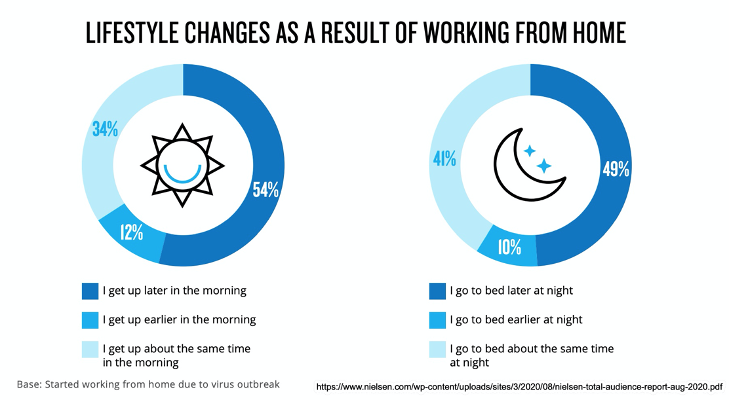Has working-from-home (#wfh) disrupted your sleep?
Sleep Disruption
Nielson reports 54% of workers have adapted to working-from-home (#wfh) and love the flexibility; however, 49% go to bed later at night and 54% wake up later than before the “new normal” occurred in early 2020 (1). Although you’re saving time from assembling your wardrobe and not fighting traffic, you probably have other distractions at home impacting your quality of sleep at night, and ability to focus during the day. Let’s learn what brain functions controls your ability to sleep and focus well; and how you can improve those functions.
Balancing REM Cycles
According to the Alaska Sleep Clinic, adults require at least four or five of 90-minute REM cycles for an optimum amount of sleep (2). Regarding sleep, your body runs on circadian rhythm and autonomic nervous balance. Your sleep-wake circadian rhythm is an internal clock that runs constantly, cycling between alertness and sleepiness, thus regulates your sleep patterns (3). Autonomic nervous balance normally functions without conscious control, or ‘automatically’ (3). Here’s something most people don’t know.
The Automatic Nervous Balance is broken down into two branches: Sympathetic branch (“Fight or Flight”), and the lesser known one, Parasympathetic branch (“Rest and Digest Response”) (3). These two branches of the Autonomic System are doing a constant balancing act, and often this means they are unbalanced. If you’re stressed and unrest, you are probably feeling unbalanced and may seek sleep aids to make your branches feel even–steven while working–from–home (#wfh). There is a long list of natural sleep aids, but not all of them are effective, clinically proven, and trademarked. As always, check with your doctor before adding supplements or making significant changes to your regimen.
How GABA Can Help Improve Your Quality of Sleep
Clinical study suggests GABA operates the body’s calming neurotransmitter, is used as a supplement to improve sleep and reduce anxiety (4). Therefore, Melatonin, the body’s sleep hormone, is used as a supplement to improve sleep, with the strongest evidence for insomnia and delayed sleep phase syndrome. Together, GABA and Melatonin have been shown to regulate sleep, according to Neural Regeneration Research (5).
If your sleep schedule is off kilter from working-from-home, try GABA with Melatonin to help regulate your sleep.
Please contact us if you are interested in reviewing the clinical study of GABA about sleep quality!
Add GABA to your cart, and note in the comments that you’re interested in Melatonin too.
References:
(2) https://www.alaskasleep.com/blog/enhance-your-sleep-cycles
(3) https://www.sleepfoundation.org/articles/what-circadian-rhythm
